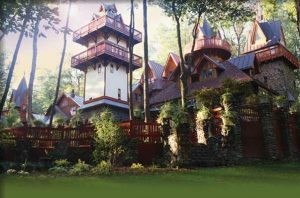When the average person looks for medieval cas- tles, they are left with two options: to look at ruins, or to look at a castles that survived into modernity. Yet, these both often inspire similar reactions. We, as moderns, look at castles and see huge defensive structures and envisionmassive movie-like sieges that must have dominated the Middle Ages. This is what we want castles to be. We want sieges and battles and, more importantly, we want our castles to be simple in purpose and thus simple in nature. See, the complicated truth is that castles were rarely used in the manner that we envision, nor in the way we might think. Castles were important pieces of all manner of medieval issues: cultural, social, economic, and militarily. Castles were used for all of these purposes— and the military purposes were rarely large sieges. Even so, we can try to put this notion aside for a moment, and think about what castles mean to us today.
Castles seem to us a symbol of dominance, or a symbol of a perhaps-noble past. Speaking from a strictly American context, the United States lacks castles, so we seem to romanticize them to a greater degree. But what does that say about us? This phenomenon is similar to the experience in the United States when Prince William was married. For those of us who live under rocks (like myself) nothing seemed amiss, but those who tuned into the news were barraged with live-coverage of the affair. Castles are like royalty: Americans lack them, and, thus, are fascinated by them. In fact, this American fascination runs quite deep. Those who require proof need only visit Landoll’s Mohican castle or Squire’s castle in Cleveland. Certainly, Americans have a history of fascination with castles—although some may argue that this only extends to British castles in particular. Perhaps this is due to our strong cultural affinity for that nation.

Fret not, however, as this endless fascination with the structures of the past hardly makes us unique. Each period of history seems to reveal that the current culture remains fascinated by cultures before them. Early Greeks looked on the works of their predecessors and saw structures that could only have been built by giants; Romans considered Greek art to be the best in the world. And then medieval peoples looked on Roman works as marvels of a lost empire. In fact, the subject of how each culture interprets the artifacts left by the past and then incorporates them into their own society is a subject that is better left to a far longer article on that subject alone. But rest assured that it does indeed happen from culture to culture. Those seeking some measure of evidence may seek out the Anglo-Saxon poem The Ruin. Ultimately, our fascination with castles and the past only prove one thing: We are not so different from our ancient and medieval ancestors.